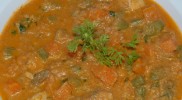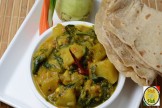This is a Indian cranberry water chutney, it is served with roti or as a sauce. ...

Rajma Masala is one of the best Indian recipes in North Indian cuisine. Rajma recipe or r...
One more recipe with fresh green peas and it becomes everyone's favorite. It's a Simple, ...

This is the variation of salan gravy with the addition of curd to increase the basic vers...

Jain gravy is a dish made without onions, ginger or garlic but is a simple and creamy dis...

Kohlrabi (knol khol) is a perennial vegetable, which is a low, stout cultivar of cabbage....
Thotakura pulusu is an amazing dish that tastes tangy, spicy, sweet and a natural earthy flavor. Made of Thota kura also known as Amaranth leaves are very popularly cooked in most of the south Indian homes.
Thotakura pulusu (stew) is a very simple and tasty dish spiced up with chilies and sweetened with jaggery. Pulusu is a clear broth (tamarind) cooked with vegetables and a spice is served as a side dish along with rice.
Thotakura in Telugu or Kuppacheera in Malayalam is scientifically referred to as Amaranthus viridis (green Amaranthus). This is the green veggie that's customarily consumed as veggie in South India. As reported by the conventional Ayurvedic medication the Amaranthus viridus can be used like a therapeutic plant in the Sanskrit name Tanduliya. It is an energetic yearly plant and can be found in summer. Root of fully developed amaranth is a super... Read More..
|
About Recipe
|
|||||||||||||||||||||||||||||||||||||||||||||||||||||
|
|||||||||||||||||||||||||||||||||||||||||||||||||||||
Thotakura in Telugu or Kuppacheera in Malayalam is scientifically referred to as Amaranthus viridis (green Amaranthus). This is the green veggie that's customarily consumed as veggie in South India. As reported by the conventional Ayurvedic medication the Amaranthus viridus can be used like a therapeutic plant in the Sanskrit name Tanduliya. It is an energetic yearly plant and can be found in summer. Root of fully developed amaranth is a superb veggie. It's white colored and it is prepared with tomatoes or tamarind gravy. It provides a milky flavor and is also alkaline.
In Andhra Pradesh, this leaf is referred to as the Thotakura and customarily well prepared with dal which is popularly known as Thotakura pappu. In Maharashtra, it is known as the "Shravani Maath" that grows in the month of Shravan and will come in both white and red colors. Khada saga (in Oriya) is required to make 'Saga Bhaja', where the leaf is fried with chilies and onions. Hulee, playa or Majjigay hulee are a variety of curries which are prepared using these greens in Karnataka. In Tamil Nadu, it is known as and is also frequently eaten like a popular food, where greens are steamed, crushed, with mild flavoring of salt, red chillis and cumin. It is termed keerai masial.
The green Amaranth is an extremely well-known food in Greece and it is known as the vlita or vleeta. It is steamed and offered just like a salad with olive oil and lemon together with fried fish. In Sri Lanka, it is termed "Koora Thampala" and is also prepared and consumed with rice. The green Amaranth leaves and stems are generally utilized as stir fry veggie or perhaps in soups in countries like China and Vietnam. Amaranth greens are viewed as to assist in boost up the eye-sight.
Benefits:
There's two varieties common as edible veggie in Vietnam: amaranthus tricolor and amaranthus viridis. They're an excellent way to obtain vitamins such as vitamin A, vitamin K, vitamin B6, vitamin C, riboflavin, folate, and dietary minerals which includes calcium, iron, magnesium, phosphorus, potassium, zinc, copper, and manganese. Due to its beneficial nourishment, numerous farmers grow amaranth nowadays.
The leaves are diuretic and purgative, and so are utilized in poultices (fresh or as dried powder) to relieve inflammations, boils and infections, gonorrhoea, orchitis and haemorrhoids. The leaves are considered to have febrifugal attributes. Ash of Amaranthus viridis plants is full of soda and it is sometimes helpful to make soap.
 Easy recipes
Easy recipes
 Healthy Recipes
Healthy Recipes
 Dessert Recipes
Dessert Recipes
 Mutton and Lamb
Mutton and Lamb  Indian Bread Recipes
Indian Bread Recipes
 Dal Recipes
Dal Recipes
 Chutney and Pickles
Chutney and Pickles  Indo-Chinese Recipes
Indo-Chinese Recipes
 Snacks and Appetizers
Snacks and Appetizers
 Low Fat Recipes
Low Fat Recipes
 Chaat Recipes
Chaat Recipes
 Biryani and Rice
Biryani and Rice  Curry Recipes
Curry Recipes
 Indian Sweet Recipes
Indian Sweet Recipes
 Egg Recipes
Egg Recipes
 Paneer Recipes
Paneer Recipes
 Chicken Recipes
Chicken Recipes
 Indian tiffins
Indian tiffins
 Egg less Recipes
Egg less Recipes
 Soups and Salads
Soups and Salads
 Indian Sea Food
Indian Sea Food
 Manchurian Recipes
Manchurian Recipes
 Indian Drinks Recipes
Indian Drinks Recipes
 Dinner Recipes
Dinner Recipes